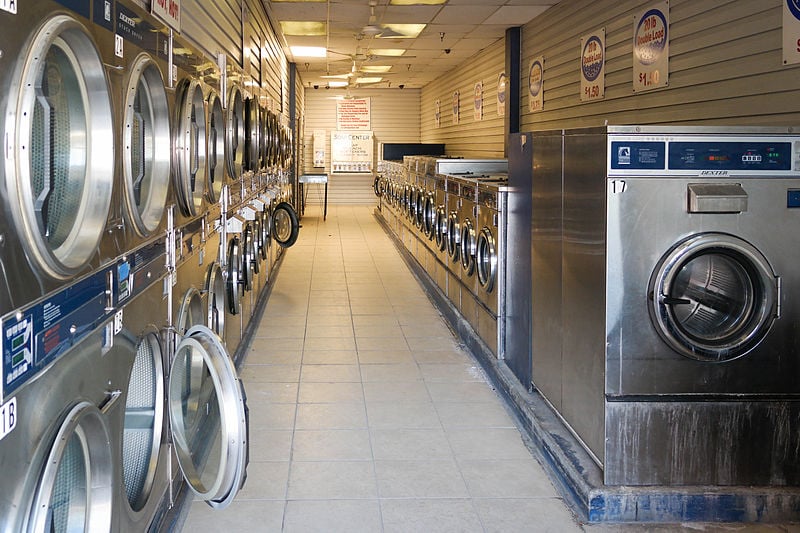
In the last week, I’ve run into two great pieces on how to offer hospitality, both by creating and supporting “third places” (a third place, apart from the home or the office for fellowship) or in one-to-one encounters. Both these pieces don’t just make actionable, concrete suggestions, they fill in lacuna in my own way of thinking about hospitality, blind spots created both by the way I prefer to socialize and my socioeconomic status.
First up, Richard Beck of Expermental Theology points out why we need to look beyond the coffeeshop model of third places (paying to consume luxuries in order to claim a space). He suggests that his own church try to create a communal space by opening a laundromat:
The poor and working poor don’t have washing and drying machines. Consequently, it’s a real, real hassle to get clothing washed. What middle and upper class people seriously take for granted is taking a few steps to throw a load of laundry into the washing machine.
Can you imagine the hassle and the disruption to your day if you had to drive–or, more likely, walk or take a bus–to a laundromat? To say nothing of the lost time standing around attending your clothing as it washes and dries?
And then there’s the money to run the machines, money you might need for dinner…
But here’s the third space upside. Do you know what people do as they sit around waiting for their clothing to wash and dry?
They talk. As neighbors.
The laundromat is a local, neighborhood third space.
In Beck’s imagining, the laundromat would be a way for the church to claim the kind of spaces people already congregate in, simply by necessity, and elevate it to a hospitable place, where you might be pleased that you have a number of loads to do, and will get to stay with others for longer. Currently, as Beck observes, the social bonds of the laundry are formed despite the barriers of decor, general dysfunction, etc; he would like his church to subsidize the joy/comfort of the people coming in.
To generalize from Beck’s approach, I’d try to look for places people had to be regularly, where there was a nascent community or one that existed in defiance of its surroundings. So, by this test, the DMV would fail (irregular attendance, no attempts at community) but any kind of weekly registration or check in with a waiting room might not. Then the church, or anyone else, could think about whether they could offer something to this small community of shared circumstances that would help them claim and cozy-up their third space. (With the caveat that it would be easy to fall into a Kipling-like mode if you try to construct what a community should want rather than becoming a member, or forming strong bonds with members, and finding out what they do want).  And speaking of wants I’m not so good at anticipating when I organize for others, Kate Donovan has a nice post on ways to see friends socially that work better for some introverts. I’ll cite her description of the situation she’s trying to ameliorate, as well as some of her solutions:
And speaking of wants I’m not so good at anticipating when I organize for others, Kate Donovan has a nice post on ways to see friends socially that work better for some introverts. I’ll cite her description of the situation she’s trying to ameliorate, as well as some of her solutions:
Premise required for this article: Some people have more trouble doing social things, including conversations, than others, and would benefit from ideas for decreasing the work of maintaining friendships. […]
1. Conversations while walking. It is an agreed upon rule that people do not make eye contact while walking and talking, which allows them to avoid that lamppost, that small child, and the little puppy wearing clothes and booties. (Let’s all take a moment to appreciate that during the winter, small dogs wear shoes to keep their tiny feetsies from becoming frostbitten.) Ahem. Anyways, another benefit of keeping your eyes ahead is that there’s far less pressure to emote in exactly the right way, maintain eye contact, or do many of the other things that can make social situations feel like work.
2. Other physically exerting activities. I know, it’s not as ‘normal’ feeling to ask someone to go to a trampoline gym with you, or suggest that you hang out by going to place with a bunch of ping-pong tables. But these all have the advantage of obviously including a component of spending time together without the more mentally-taxing aspect of having to hold up your end of conversation as intensely as getting coffee together requires.
I suggested last week on my radio show that it’s helpful to engineer into your conversations socially acceptable excuses to be silent, but I suggested eating. Because I’m such a noodge, it wouldn’t occur to me to suggest (gasp, wheeze) physical exertion. But it does spur me to think of other settings where conversation is necessarily interrupted by another activity (assembling furniture, painting sets, building and launching model rockets, etc — your lists may vary) as a way to make it easier to create and deepen friendships and acquaintanceships without the pressure of “sit down, stare at each other, and talk.”
Your suggestions?












